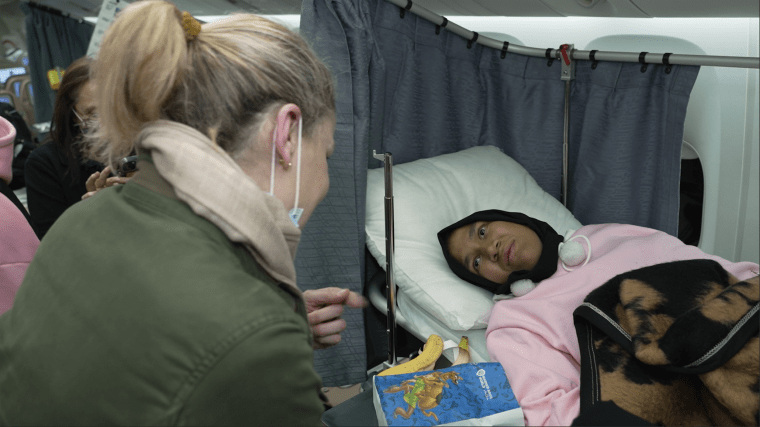EL-ARISH, Egypt — For 56 critically ill and wounded Gazans, the road to crucial medical care started Tuesday on a military airfield in Egypt’s northern Sinai. This is where a plane was parked, awaiting patients driven in on ambulances from area hospitals or from inside Gaza.
Such "mercy" flights are made possible by countries such as the United Arab Emirates, where commercial planes are retrofitted with stretchers and beds to ferry patients on a four-hour trip from Egypt to Abu Dhabi to receive medical care. Tuesday’s flight was the UAE’s eleventh humanitarian airlift since the Israel-Hamas war began with the Oct. 7 attacks.
The patients on Tuesday’s flight were mainly children with complex fractures and head injuries. A few have chronic illnesses that have been left untreated since the supply of medicine into Gaza slowed to a trickle after the start of the war. The patients are tended to by a team of doctors and nurses who are on the flight with them.
“I remember the first girl that we evacuated in the first plane,” said Dr. Maha Barakat, the UAE's assistant minister of foreign affairs for health. “She had complex fractures and many broken bones. And her mother told us that for the first time in two months, she smiled when we were able to give her painkillers that relieved her of her pain.”
Desperate need for medicine and care
Gaza’s crumbling infrastructure and hospital system means that there are few places that the sick and injured, now at nearly 66,000, can access care. More than 26,900 people have been killed in Gaza since the war started, according to the Gaza Health Ministry. There have been 645 attacks on the health system in Palestinian territories, as of mid-January, according to the World Health Organization.
Among the injured is 12-year-old Nour, whose legs were shattered in a bombing. She needs an operation in a well-equipped hospital to avoid further complications, including, in a worst-case scenario, the possible amputation of her leg.
Nour winced in pain as she expressed her desire to “stay out” of Gaza when asked where she’d like to be when she recovers.
Mai Blata, who suffers from a complicated genetic disorder, has not had access to essential medication since it ran out in Gaza. Her mother told NBC News that the lack of ophidine to treat her condition has left her with acute renal failure and nerve damage. Unable to walk, Mai was lifted onto the plane on a stretcher.

The UAE said it is learning how to improve the evacuation logistics with each flight. Reaching patients on an approved list of evacuees was tricky with communication blackouts in Gaza, so it is now asking the remaining functioning hospitals to supply their own names. In the southern part of Gaza, which used to have 12 hospitals, only seven are now partially functioning, according to the WHO.
And with pharmaceutical supplies exhausted and few shipments going in, potentially life-saving treatments for cancer and other serious conditions are unavailable. The Israeli government insists that it has “not blocked the import of chemotherapy medicine” into Gaza.
For patients on Tuesday’s flight, this is not the end of the road. After treatment, there are still questions about what happens next and what home, if there is one left, they will be able to return to in Gaza.
Seven-year-old Zahra Jaber cried for her mother as she was lifted onto the plane on a stretcher. “Mama is what she calls me now,” her aunt, who was accompanying her on the plane, told NBC News. “Because her mother isn’t here.”